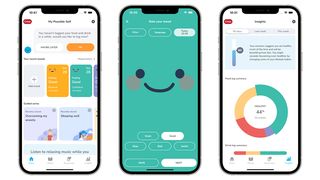How The My Possible Self App Uses CBT To Improve Your Mental Health
This free NHS-approved app has tools to help you manage and improve your mood, and reduce anxiety

If you’re not already aware, there is an NHS apps library which highlights health and wellbeing apps that meet its clinical and technical standards. It’s the place to find apps that can really help to improve your life, and helps you separate the wheat from the chaff in an overloaded apps market.
One app that meets the NHS standard is My Possible Self (App Store and Google Play), which has been created with input from the experts at independent mental healthcare provider the Priory Group. The free app uses cognitive behavioural therapy (CBT) techniques to help people manage common mental health conditions like stress and anxiety.
To mark World Mental Health Day 2021 on Sunday 10th October, My Possible Self is expanding what it offers to include a wide range of new content, including workout videos, mindfulness classes and recipes.
We spoke to Joe McEvoy, director of innovation and digital at the Priory Group and a CBT therapist, about the CBT techniques that underpin the app and how it can help people.
What is CBT and how is it used in the app?
Traditionally CBT is a talking therapy that helps you manage your problems by changing the way that you think. It has a really solid evidence base behind it, which dates right back to the 1950s. With the app we’ve created what we call modules on things like managing anxiety and depression. They follow a similar sequence to the way CBT works, which gets you to assess the thoughts you’re having and identify patterns. It then gives you a set of tools to help you change the way in which those less-than-helpful ways of thinking impact upon your life.
There’s a whole lot of evidence-based practice behind it, with tried-and-tested tools and techniques. We built it with My Possible Self providing the technology, and we provided the clinical input so that all of the tools, techniques and assessments are as you might experience if you were in talking therapy with a therapist.
Will this help people access this kind of therapy?
Absolutely. The app is free to everybody, whether they’re in this country or around the world. We know that a lot of people can’t access services through the NHS because of waiting lists and some of the challenges that the NHS has and we know that not everybody can come to the Priory because they can’t afford it. So this is a really great opportunity for people to be able to access something that’s free which does much of what CBT therapy does.
Get the Coach Newsletter
Sign up for workout ideas, training advice, reviews of the latest gear and more.

As an example of the tools in the app and how they help, can you explain the “reframing thoughts” tool?
The reframing thoughts tool is effectively an opportunity for people to put down thoughts which might bother them. A thought such as “I’m a really bad person” or “I must be really bad at my job”, whatever it might be – negative thoughts. People can get into a vicious cycle around thinking these thoughts, and not be able to get away from them, which then impacts upon their feelings.
The reframing thoughts tool effectively invites the individual to engage in a number of things. One of the important things is to ask: what’s the evidence for this? Let’s write down what the evidence is for me being a bad person. Maybe somebody told me that, or lots of people told me that. Am I doing bad things? Then we say, “How can we reframe that thought in a different way?”
A natural reframing of something like that might be that “I feel bad about myself at times”, rather than “I am a bad person”. It’s working to break down some of those thoughts that feel overwhelming. When you can break them down into smaller parts, you can start to reframe them in different ways that make them positive. A lot of CBT is about “if you can’t find the evidence for this, then try and find a different way of thinking about it, try and find ways to be kinder to yourself”. Because ultimately, very few of us are actually bad people.
See related
- Here’s How To Tell If You Should See A Doctor About Your Mental Health
- How To Recognise When Someone Is Struggling With Their Mental Health
- Look After Your Mental Health With This Five-Day Plan For Minimising Stress
Can it help break the cycle of negative thoughts?
Exactly. And the thing about thoughts is, they are just thoughts. They’re not things. But what we do quite naturally is, when we think something, we often think it again. And the more we keep thinking it, the more prominent it becomes, and then it starts to lead to feelings.
So if I’m constantly thinking that I’m a bad person, I start to feel like I’m a bad person, then I start to feel upset or anxious or depressed, or whatever else it might be. It’s about breaking that cycle that we can all get into.

Nick Harris-Fry is a journalist who has been covering health and fitness since 2015. Nick is an avid runner, covering 70-110km a week, which gives him ample opportunity to test a wide range of running shoes and running gear. He is also the chief tester for fitness trackers and running watches, treadmills and exercise bikes, and workout headphones.

This Expert PT Recommends Kettlebell Training For Strength, Power And Cardio Gains—And These Are The Six Exercises To Master First

I’ve Run The London Marathon Six Times—Here Are Four Ways To Set-Up Your Garmin Watch For A Better Race

Forget Crunches, This Exercise Is A Better Way To Build A Strong Core